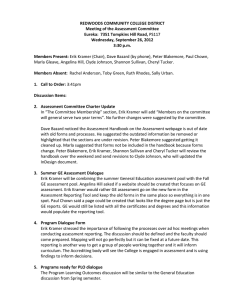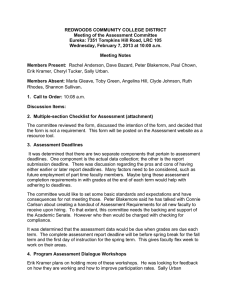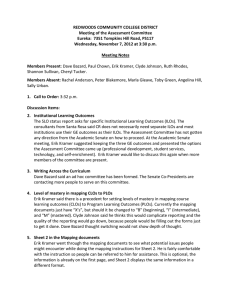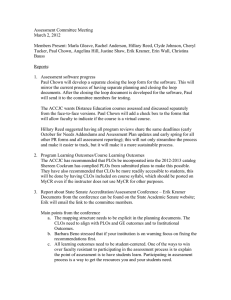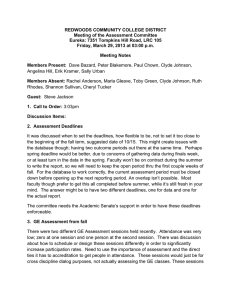REDWOODS COMMUNITY COLLEGE DISTRICT Meeting of the Assessment Committee Eureka: 7351 Tompkins Hill Road, PS117
advertisement
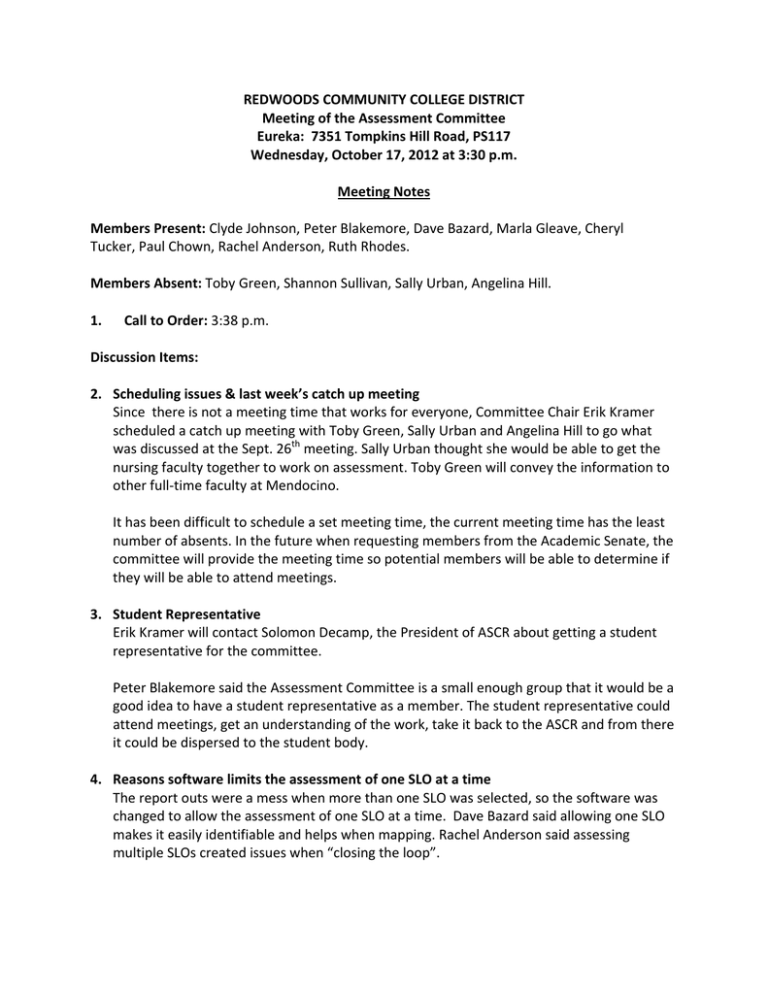
REDWOODS COMMUNITY COLLEGE DISTRICT Meeting of the Assessment Committee Eureka: 7351 Tompkins Hill Road, PS117 Wednesday, October 17, 2012 at 3:30 p.m. Meeting Notes Members Present: Clyde Johnson, Peter Blakemore, Dave Bazard, Marla Gleave, Cheryl Tucker, Paul Chown, Rachel Anderson, Ruth Rhodes. Members Absent: Toby Green, Shannon Sullivan, Sally Urban, Angelina Hill. 1. Call to Order: 3:38 p.m. Discussion Items: 2. Scheduling issues & last week’s catch up meeting Since there is not a meeting time that works for everyone, Committee Chair Erik Kramer scheduled a catch up meeting with Toby Green, Sally Urban and Angelina Hill to go what was discussed at the Sept. 26th meeting. Sally Urban thought she would be able to get the nursing faculty together to work on assessment. Toby Green will convey the information to other full‐time faculty at Mendocino. It has been difficult to schedule a set meeting time, the current meeting time has the least number of absents. In the future when requesting members from the Academic Senate, the committee will provide the meeting time so potential members will be able to determine if they will be able to attend meetings. 3. Student Representative Erik Kramer will contact Solomon Decamp, the President of ASCR about getting a student representative for the committee. Peter Blakemore said the Assessment Committee is a small enough group that it would be a good idea to have a student representative as a member. The student representative could attend meetings, get an understanding of the work, take it back to the ASCR and from there it could be dispersed to the student body. 4. Reasons software limits the assessment of one SLO at a time The report outs were a mess when more than one SLO was selected, so the software was changed to allow the assessment of one SLO at a time. Dave Bazard said allowing one SLO makes it easily identifiable and helps when mapping. Rachel Anderson said assessing multiple SLOs created issues when “closing the loop”. Peter Blakemore asked about having meeting going through the Assessment Reporting Tool (ART) and discussing issues. Dave Bazard agreed and said this would familiarize committee members to ART and they will be able to help other faculty. Erik Kramer will set up a few Assessment software training sessions two weeks before and during Finals Week. Marla GleaveAdditionally room will be reserved for part‐time faculty who want to enter their assessment data and have access to Assessment Committee members if they need help. Possible rooms: AT 100, FM 107, LRC 105 (has live video feed). Erik Kramer will double‐check with Utpal to find out when SLO/PLO mapping spreadsheets will be uploaded to the web. 5. Program Assessment Dialogue sessions There are prompts in the Assessment software if someone wanted to do a dialog. There is a way for the group to look at reports and see if there are problems and for the group to help. Dave Bazard said last spring it was clear most people were filling out the assessment report incorrectly. Peter Blakemore suggested setting up training sessions and using a couple of good reports as example of what works. Erik Kramer thought this could be a part of the CLO training. Erik Kramer send an email about having scheduling another PLO discussion and will develop a “cheat sheet” between now and then. The dialog sessions can invite committee members if they want for additional guidance. 6. GE Assessment Cycle for Future Terms Erik Kramer suggested using the fourth semester for institutional dialog. Dave Bazard suggested using the fourth semester to revising assessment. Peter Blakemore suggested getting a large group together and instead of looking at the outcomes, to try to assess something new from the outcome. At Napa Valley College, they assess for two traits all students graduating with an art degree should have as well as assessing the outcomes. Another idea would be to use the fourth semester to assess outcomes that are not frequently assessed. GE outcomes will continue to be assessed in the same order but the fourth semester will be used for institutional dialog. Dave Bazard said that since the very first semester of assessment was a small group and the software was different that assessment of GE outcomes should still take place this fourth semester. 7. Institutional Outcomes The Assessment Committee will have to decide on the model to recommend be implemented. Most institutions use their GE outcomes as their institutional outcomes. Others have separate Institutional Learning Outcomes. Dave Bazard recommended looking at a well‐regarded school that has passed accreditation to see what type of model they use. Possible ILOs discussed: An outcome that would cover students that take courses for self‐enrichment or are enrolled in a low‐unit certificate. A student services focused outcome Computer literacy or technology based outcome Personal responsibility An overarching outcome could be added without disrupting the GE outcomes and it would not be a major overhaul of GE. Rachel Anderson recommended whatever is decided has to be decided upon in time for the catalog. Erik Kramer will add this as a discussion item to a future Assessment Committee agenda. 8. Preparation for ACCJC Team visit Every Assessment Committee member should read the SLO status report. Erik Kramer will send an email with the report web link to all faculty and associate faculty with a recommendation they read the report in preparation for the team visit. The report provides information that the accreditation team might ask and has the data that shows College of the Redwoods is in the proficiency level. Even if the faculty does not read the entire report they will see the percentage of progress that has been made. Dave Bazard also asked the committee read Recommendation 1 in the Show Cause Report. 9. Meeting Adjourned: 5:00 pm
